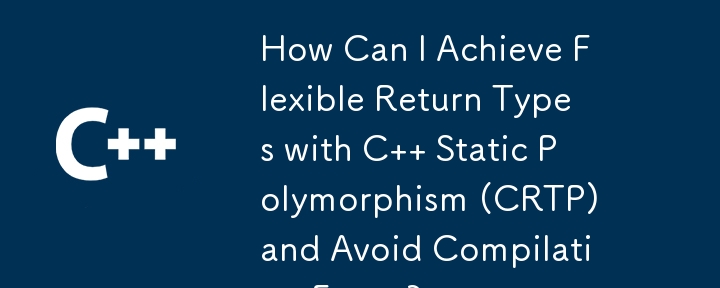Home >Backend Development >C++ >How Can I Achieve Flexible Return Types with C Static Polymorphism (CRTP) and Avoid Compilation Errors?
How Can I Achieve Flexible Return Types with C Static Polymorphism (CRTP) and Avoid Compilation Errors?
- Mary-Kate OlsenOriginal
- 2024-12-09 00:04:15852browse

C Static Polymorphism (CRTP) Using Derived Class Typedefs
The curiously recurring template pattern (CRTP) allows for static polymorphism in C , but it becomes challenging when aiming to modify function return types based on the derived type. While CRTP can typically infer the derived type, the following code encounters compilation issues in MSVC 2010:
template <typename derived_t>
class base {
public:
typedef typename derived_t::value_type value_type;
};
template <typename T>
class derived : public base<derived<T>> {
public:
typedef T value_type;
};
This error arises because the derived class is incomplete when used as a template parameter for the base class in the base class list. To address this issue, a common workaround involves employing a traits class template:
// Declare the base_traits class template
template <typename derived_t>
struct base_traits;
// Define the base class
template <typename derived_t>
struct base {
typedef typename base_traits<derived_t>::value_type value_type;
};
// Define the derived class
template <typename T>
struct derived : public base<derived<T>> {
typedef typename base_traits<derived<T>>::value_type value_type;
};
// Specialization of base_traits for derived
template <typename T>
struct base_traits<derived<T>> {
typedef T value_type;
};
By specializing the base_traits template for the desired derived types, you can define the required members, including custom return types for functions like foo(). This technique enables static polymorphism with more flexibility in return types while avoiding compilation errors.
The above is the detailed content of How Can I Achieve Flexible Return Types with C Static Polymorphism (CRTP) and Avoid Compilation Errors?. For more information, please follow other related articles on the PHP Chinese website!
Related articles
See more- Is Cplusplus.com a Reliable Source for C Documentation?
- What's the most reliable way to handle Ctrl-C events in C ?
- How Does OpenCV\'s `cvWaitKey()` Function Handle Key Presses and Window Events?
- Why Return a Reference, Not a Value, from a C Copy Assignment Operator?
- Why Does Initializing a C Array with a Variable Size Result in an Error?

